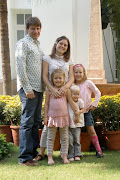(A much shorter version of this article was published in the December issue of our neighborhood newsletter, The Samvada, in New Friends Colony, Delhi.)
Since moving to Delhi from Canada three years ago, we have been blessed with many friends. Though we share many things in common with our new friends, very few of them share the same faith as us. We are Christians, or Followers of Jesus, as we like to say. Though we realize that we are a minority among mostly Hindus, Sikhs, and Muslims, we have felt very welcomed here and free to express our faith. In general, our interaction with people of other faiths has been overwhelmingly positive. For that, we are very grateful.
One of the things my wife and I love about India is the openness that people have toward religious expression. Most people here talk about their faith very easily. We have found that in the West people are much more reserved in this regard and prefer to keep their religious matters more private. In general this means that religious plurality in India has quite a different flavor than the same in the West. Here, most people assume the diversity and affirm it. In the West, however, many people seem to feel threatened by the increasing religious diversity, and are responding to it by seeking to limit the freedom of expression. Here in India we find the freedom refreshing.
When we first came to India it was on the eve of Divali. We watched with great interest the lively celebration during the festival of lights. By now, we have also learned the stories of the Ramayana and have observed firsthand the Laxmi puja in the homes of our Hindu neighbors. We respect their earnest prayers for blessing.
We have also had the privilege to participate in Eid celebrations with our Muslim friends, and even to break fast with them on occasion during Ramadan. We likewise have grown to respect the humble devotion of our Muslim neighbors.
At the same time, then, we take opportunities to tell the story of Jesus and share about our love for him, whether it's at Christmas or Easter or whenever. In this way, we feel that the interest that we have shown in others has also been reciprocated to us, giving us the comforting sense that faith and religion are valued here, even when differences abound.
Soon after we settled into our new home, a man approached me in a park near to our home. Incidentally, I was in the park that day with my family celebrating Easter, a special day that most Christians set aside to commemorate the resurrection of Jesus. This man was not only eager to know what we were doing, but after finding out he was eager also to call his own children and have them participate. This man has become one of my closest friends in India. As a Hindu, he has shared freely with me about his spirituality, and I have shared freely with him about my devotion to Jesus.
This friend, in turn, introduced me to an organization called the Interfaith Coalition for Peace (ICP), which is based in my neighborhood, and rents office space from my friend. This group is working throughout the country on various issues that challenge the peaceful co-existence of numerous faith communities in India, places like Kashmir and Orissa. The leadership of ICP consists of Muslims, Hindus, Sikhs and Christians and exemplifies good multi-faith cooperation. I have been impressed with the people that I have met at ICP, as well as with the work they are doing (www.icpindia.org).
On another occasion, I was walking the street in our neighborhood and was warmly greeted by another man. In a very friendly manner, he boldly asked questions about who I was and what I was doing in India. We became good friends and we now spend time together on a regular basis. He has introduced me to his teacher, or as he is called in their Islamic tradition, his Maulana. Together, my friend and I visited this Maulana and we shared some of our faith journey together. The Maulana also explained the origin and work of the Center for Peace and Spirituality (www.cpsglobal.org), a Delhi-based organization that he founded which is committed to spreading the message of Islam and of peace.
As a result of meeting these various people, I was able to be a part of organizing a public dialogue recently called “Perspectives on Peacemaking: Muslims and Christians in Constructive Conversation.” On a Saturday evening in October, a little over a hundred people gathered in a small South Delhi auditorium to participate in this effort to understand one another and work together for peace. The event was co-sponsored by the ICP and CPS.
It was a special evening for me not only because I saw so many of my friends from various aspects of my life in Delhi come together in one place, but I was reminded about how warmly I have been received in my neighborhood by people of faiths other than my own. It was also a picture to me of what can be accomplished as people humbly acknowledge their interdependence and resolve to look beyond their differences for a good purpose. I hope to be involved in other events that bring together other religions in a similar manner.
It seems to me that, although there is obviously much common ground between the different religions (a point that is often made in India), yet we are also different, especially when it comes to religion. It is important that we not shy away from these differences. The Bible, for example, is different than the Vedas or the Qu'ran. Each book gives its unique perspective. Some aspects may be common, as in the case of the Golden Rule of social interaction: “Treat others like you would want to be treated yourself.” But the differences are there as well, sometimes subtle, sometimes blatant. The Person of Jesus Christ, for instance, is for Christians the Son of God, a term which is an offense to Muslims who believe, according to the Qu’ran, that Jesus is merely a prophet, albeit a special prophet. Hindus may accept Jesus as Divine, but they would most likely differ with the doctrines of the Christian Church in terms of understanding his exclusive claims to Deity. We need to help each other understand these differences and at the same time affirm our solidarity.
Sadly, we realize that much of the recent violence in this nation has a religious element, and even sometimes has at its root a specific inter-religious conflict. We also know that Delhi is not immune to the strong feelings of hate and mistrust that people have toward others of certain religious groups.
As people of faith, we want to be numbered among those who will work for peace in this nation and in our world. As Christians, we are especially responsible to heed the words of Christ that say not only, Love God and love your neighbor, but also, Love your enemy. We also believe that the peace we have in our own relationship with God provides the foundation to peaceful relationships with others. As we live lives of love and forgiveness, it is our hope that others also will be convinced to follow in this path.
Due to the quality of people that I have met in my own neighborhood and in Delhi at large, and the deep level of friendship that I have with them, I have great hope that much more can be accomplished in terms of peace and mutual understanding. I have personally been blessed by such interaction and I continue to give thanks to God for the opportunity to live out my own faith in Jesus in such a rich multi-faith context here in Delhi.
































No comments:
Post a Comment